中考英语专题专讲转练--简单句、并列句、复合句(含答案)
文档属性
| 名称 | 中考英语专题专讲转练--简单句、并列句、复合句(含答案) |
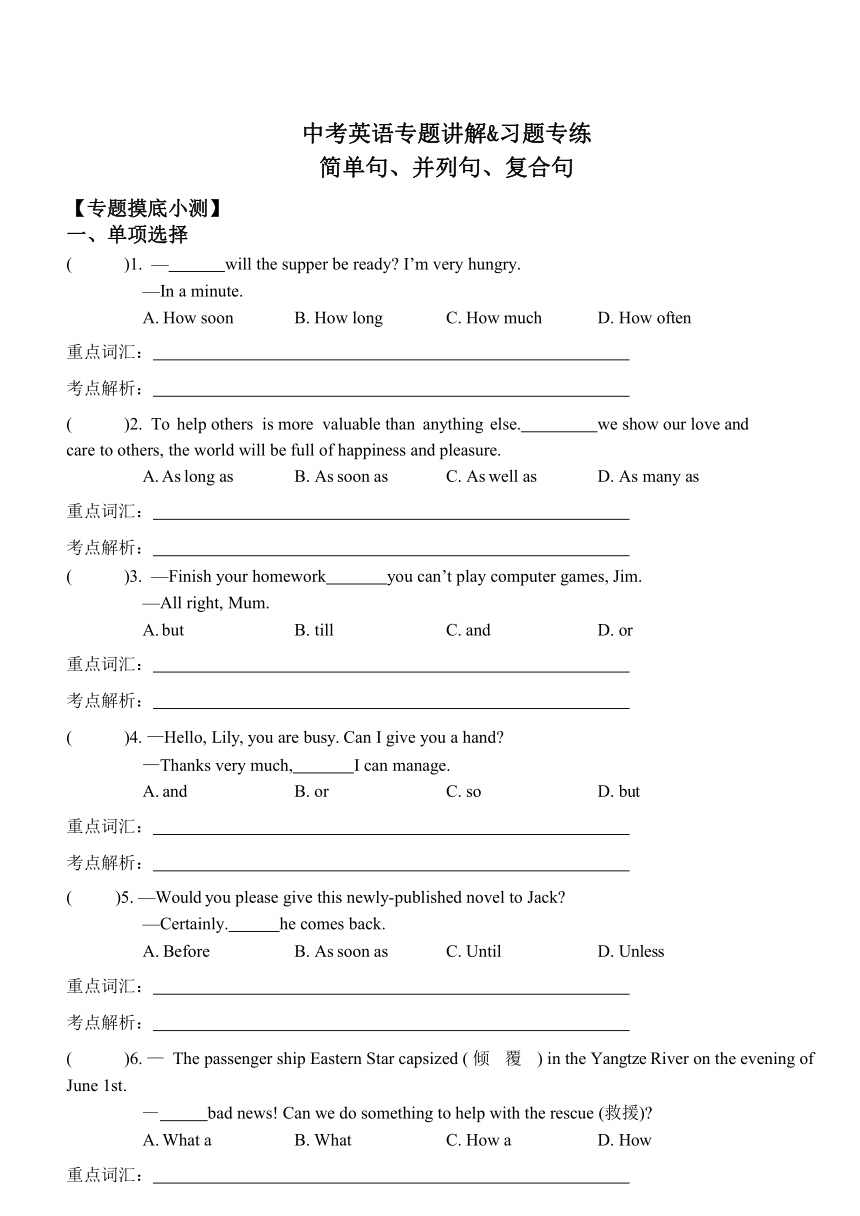
|
|
| 格式 | docx | ||
| 文件大小 | 80.0KB | ||
| 资源类型 | 教案 | ||
| 版本资源 | 人教新目标(Go for it)版 | ||
| 科目 | 英语 | ||
| 更新时间 | 2020-10-12 00:00:00 | ||
图片预览

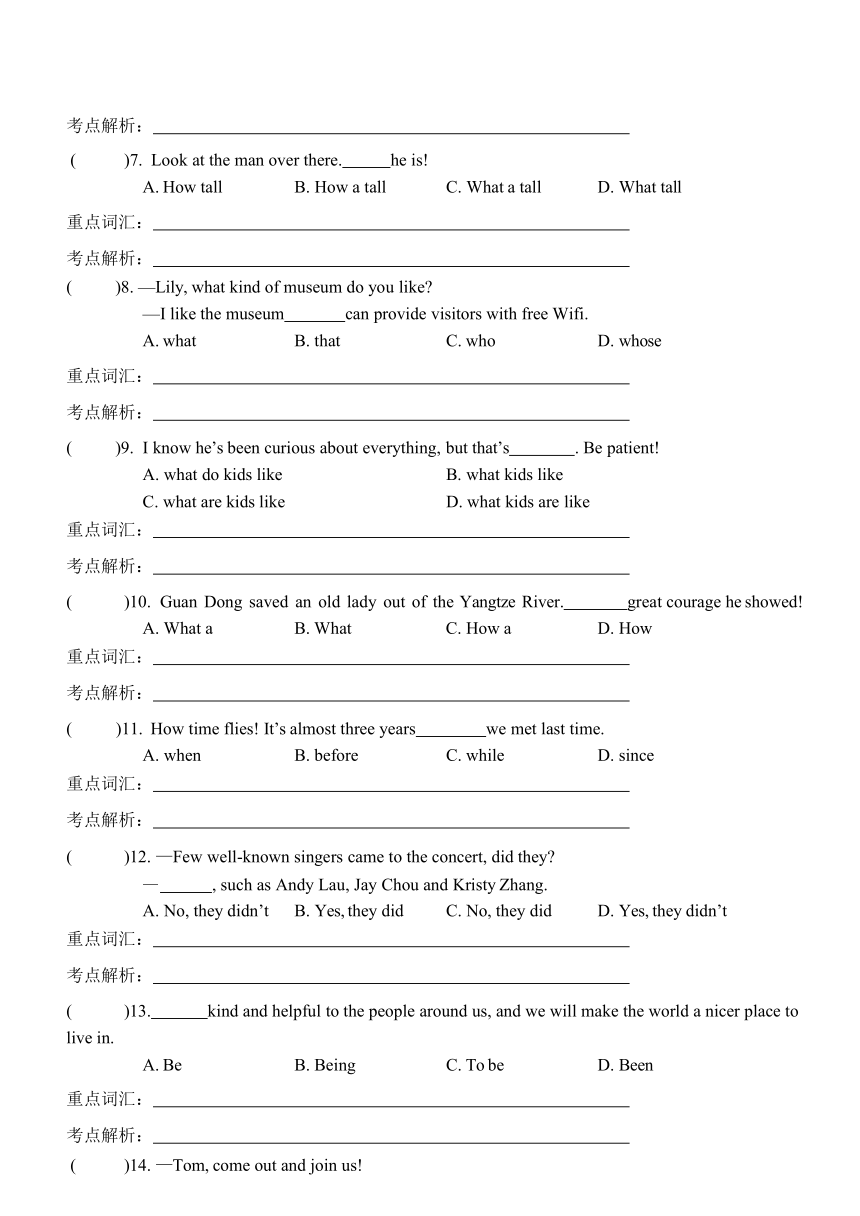
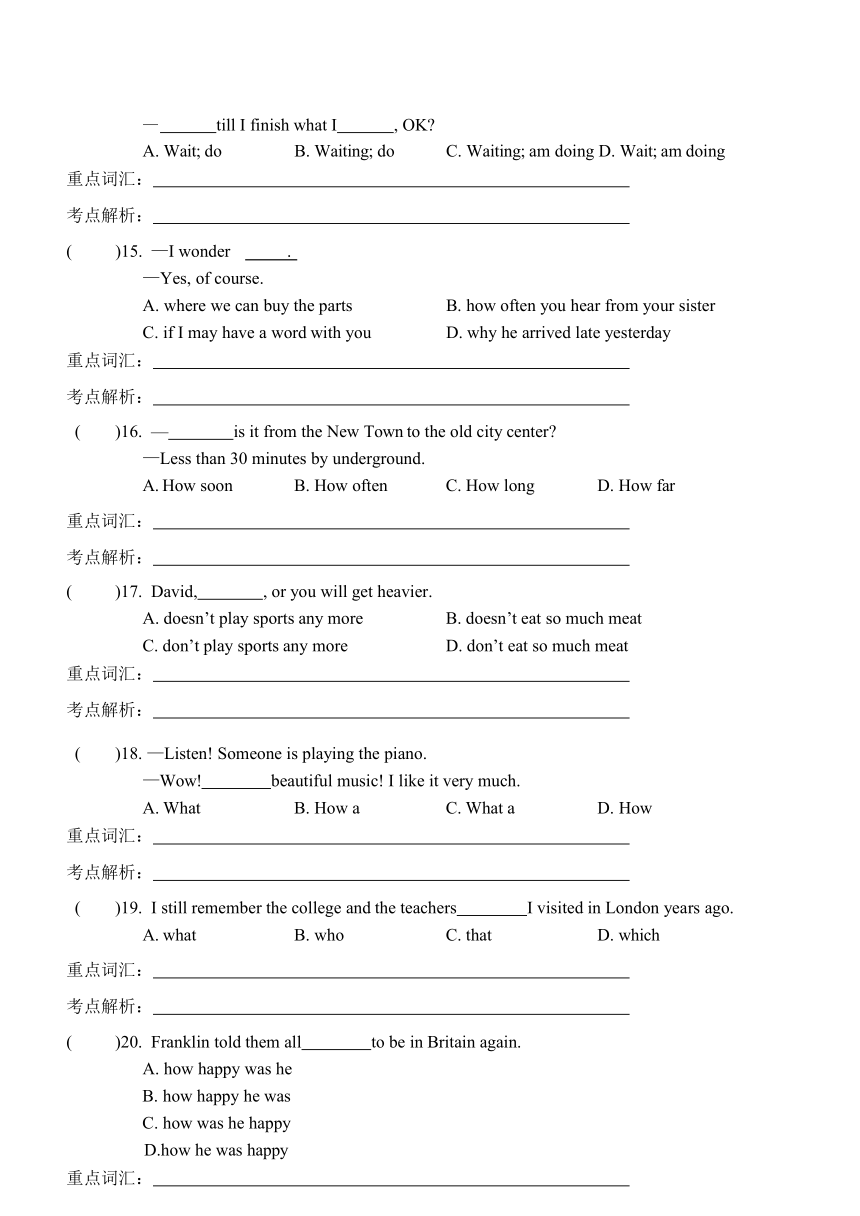
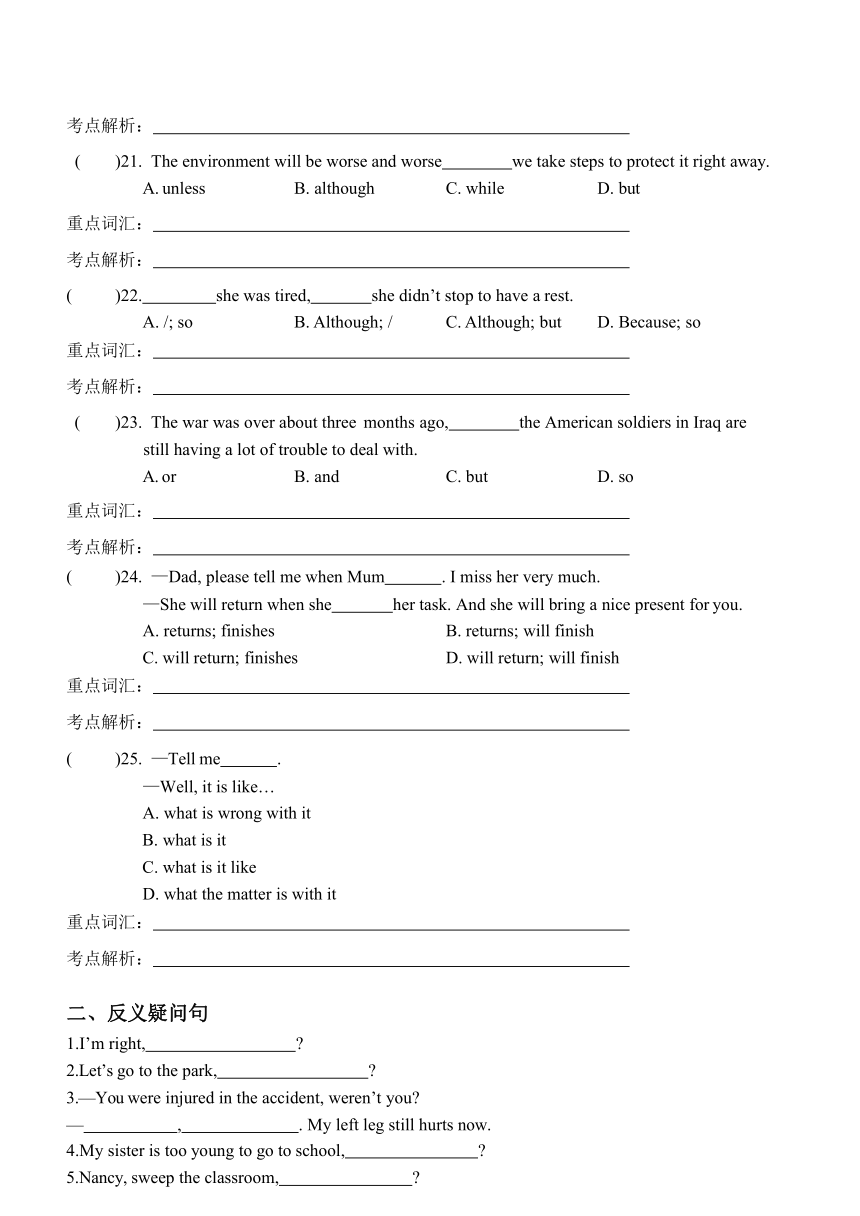
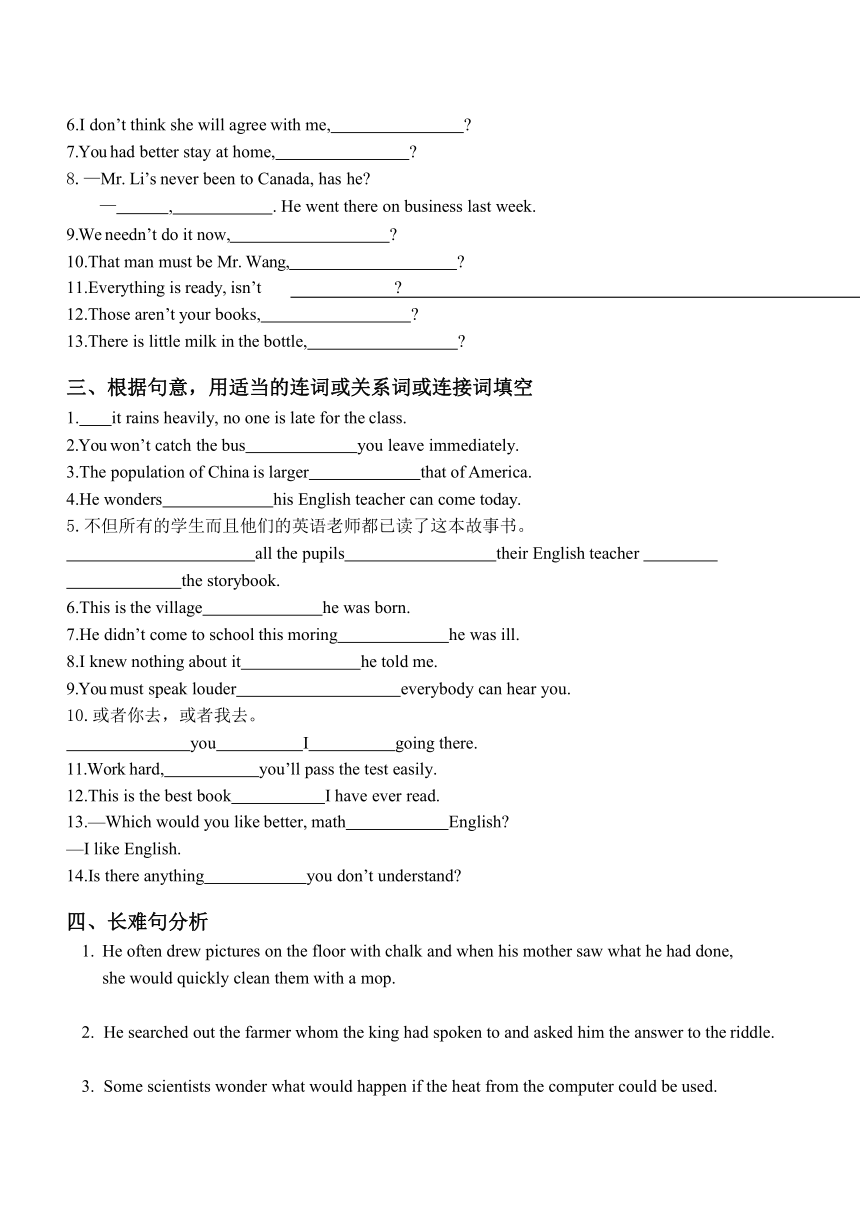
文档简介
中考英语专题讲解&习题专练
简单句、并列句、复合句
【专题摸底小测】
一、单项选择
(
)1.
—
will
the
supper
be
ready?
I’m
very
hungry.
—In
a
minute.
How
soon
B.
How
long
C.
How
much
D.
How
often
重点词汇:
考点解析:
(
)2.
To
help
others
is
more
valuable
than
anything
else.
we
show
our
love
and
care
to
others,
the
world
will
be
full
of
happiness
and
pleasure.
As
long
as
B.
As
soon
as
C.
As
well
as
D.
As
many
as
重点词汇:
考点解析:
(
)3.
—Finish
your
homework
you
can’t
play
computer
games,
Jim.
—All
right,
Mum.
but
B.
till
C.
and
D.
or
重点词汇:
考点解析:
(
)4.
—Hello,
Lily,
you
are
busy.
Can
I
give
you
a
hand?
—Thanks
very
much,
I
can
manage.
and
B.
or
C.
so
D.
but
重点词汇:
考点解析:
(
)5.
—Would
you
please
give
this
newly-published
novel
to
Jack?
—Certainly.
he
comes
back.
Before
B.
As
soon
as
C.
Until
D.
Unless
重点词汇:
考点解析:
(
)6.
—
The
passenger
ship
Eastern
Star
capsized
(
倾
覆
)
in
the
Yangtze
River
on
the
evening
of
June
1st.
bad
news!
Can
we
do
something
to
help
with
the
rescue
(救援)?
What
a
B.
What
C.
How
a
D.
How
重点词汇:
考点解析:
(
)7.
Look
at
the
man
over
there.
he
is!
How
tall
B.
How
a
tall
C.
What
a
tall
D.
What
tall
重点词汇:
考点解析:
(
)8.
—Lily,
what
kind
of
museum
do
you
like?
—I
like
the
museum
can
provide
visitors
with
free
Wifi.
what
B.
that
C.
who
D.
whose
重点词汇:
考点解析:
(
)9.
I
know
he’s
been
curious
about
everything,
but
that’s
.
Be
patient!
A.
what
do
kids
like
B.
what
kids
like
C.
what
are
kids
like
D.
what
kids
are
like
重点词汇:
考点解析:
(
)10.
Guan
Dong
saved
an
old
lady
out
of
the
Yangtze
River.
great
courage
he
showed!
A.
What
a
B.
What
C.
How
a
D.
How
重点词汇:
考点解析:
(
)11.
How
time
flies!
It’s
almost
three
years
we
met
last
time.
A.
when
B.
before
C.
while
D.
since
重点词汇:
考点解析:
(
)12.
—Few
well-known
singers
came
to
the
concert,
did
they?
,
such
as
Andy
Lau,
Jay
Chou
and
Kristy
Zhang.
A.
No,
they
didn’t
B.
Yes,
they
did
C.
No,
they
did
D.
Yes,
they
didn’t
重点词汇:
考点解析:
(
)13.
kind
and
helpful
to
the
people
around
us,
and
we
will
make
the
world
a
nicer
place
to
live
in.
Be
B.
Being
C.
To
be
D.
Been
重点词汇:
考点解析:
(
)14.
—Tom,
come
out
and
join
us!
till
I
finish
what
I
,
OK?
A.
Wait;
do
B.
Waiting;
do
C.
Waiting;
am
doing
D.
Wait;
am
doing
重点词汇:
考点解析:
(
)15.
—I
wonder
.
—Yes,
of
course.
A.
where
we
can
buy
the
parts
B.
how
often
you
hear
from
your
sister
C.
if
I
may
have
a
word
with
you
D.
why
he
arrived
late
yesterday
重点词汇:
考点解析:
(
)16.
—
is
it
from
the
New
Town
to
the
old
city
center?
—Less
than
30
minutes
by
underground.
How
soon
B.
How
often
C.
How
long
D.
How
far
重点词汇:
考点解析:
(
)17.
David,
,
or
you
will
get
heavier.
A.
doesn’t
play
sports
any
more
B.
doesn’t
eat
so
much
meat
C.
don’t
play
sports
any
more
D.
don’t
eat
so
much
meat
重点词汇:
考点解析:
(
)18.
—Listen!
Someone
is
playing
the
piano.
—Wow!
beautiful
music!
I
like
it
very
much.
A.
What
B.
How
a
C.
What
a
D.
How
重点词汇:
考点解析:
(
)19.
I
still
remember
the
college
and
the
teachers
I
visited
in
London
years
ago.
what
B.
who
C.
that
D.
which
重点词汇:
考点解析:
(
)20.
Franklin
told
them
all
to
be
in
Britain
again.
how
happy
was
he
how
happy
he
was
how
was
he
happy
D.how
he
was
happy
重点词汇:
考点解析:
(
)21.
The
environment
will
be
worse
and
worse
we
take
steps
to
protect
it
right
away.
unless
B.
although
C.
while
D.
but
重点词汇:
考点解析:
(
)22.
she
was
tired,
she
didn’t
stop
to
have
a
rest.
A.
/;
so
B.
Although;
/
C.
Although;
but
D.
Because;
so
重点词汇:
考点解析:
(
)23.
The
war
was
over
about
three
months
ago,
the
American
soldiers
in
Iraq
are
still
having
a
lot
of
trouble
to
deal
with.
or
B.
and
C.
but
D.
so
重点词汇:
考点解析:
(
)24.
—Dad,
please
tell
me
when
Mum
.
I
miss
her
very
much.
—She
will
return
when
she
her
task.
And
she
will
bring
a
nice
present
for
you.
A.
returns;
finishes
B.
returns;
will
finish
C.
will
return;
finishes
D.
will
return;
will
finish
重点词汇:
考点解析:
(
)25.
—Tell
me
.
—Well,
it
is
like…
what
is
wrong
with
it
what
is
it
what
is
it
like
what
the
matter
is
with
it
重点词汇:
考点解析:
二、反义疑问句
1.I’m
right,
?
2.Let’s
go
to
the
park,
?
3.—You
were
injured
in
the
accident,
weren’t
you?
—
,
.
My
left
leg
still
hurts
now.
4.My
sister
is
too
young
to
go
to
school,
?
5.Nancy,
sweep
the
classroom,
?
6.I
don’t
think
she
will
agree
with
me,
?
7.You
had
better
stay
at
home,
?
8.—Mr.
Li’s
never
been
to
Canada,
has
he?
—
,
.
He
went
there
on
business
last
week.
9.We
needn’t
do
it
now,
?
10.That
man
must
be
Mr.
Wang,
?
11.Everything
is
ready,
isn’t
?
12.Those
aren’t
your
books,
?
13.There
is
little
milk
in
the
bottle,
?
三、根据句意,用适当的连词或关系词或连接词填空
1.
it
rains
heavily,
no
one
is
late
for
the
class.
2.You
won’t
catch
the
bus
you
leave
immediately.
3.The
population
of
China
is
larger
that
of
America.
4.He
wonders
his
English
teacher
can
come
today.
5.不但所有的学生而且他们的英语老师都已读了这本故事书。
all
the
pupils
their
English
teacher
the
storybook.
6.This
is
the
village
he
was
born.
7.He
didn’t
come
to
school
this
moring
he
was
ill.
8.I
knew
nothing
about
it
he
told
me.
9.You
must
speak
louder
everybody
can
hear
you.
10.或者你去,或者我去。
you
I
going
there.
11.Work
hard,
you’ll
pass
the
test
easily.
12.This
is
the
best
book
I
have
ever
read.
13.—Which
would
you
like
better,
math
English?
—I
like
English.
14.Is
there
anything
you
don’t
understand?
四、长难句分析
He
often
drew
pictures
on
the
floor
with
chalk
and
when
his
mother
saw
what
he
had
done,
she
would
quickly
clean
them
with
a
mop.
He
searched
out
the
farmer
whom
the
king
had
spoken
to
and
asked
him
the
answer
to
the
riddle.
Some
scientists
wonder
what
would
happen
if
the
heat
from
the
computer
could
be
used.
【参考答案】
一、单项选择
1—5:AADDB
6—10:BABDB
11—15:DBADC
16—20:DDACB
21—25:ABCCA
二、反义疑问句
1.
aren’t
I
2.
shall
we
3.
Yes,
I
was
4.
is
she
5.
won’t
you/will
you
6.
will
she
7.
hadn’t
you
8.
Yes;he
has
9.
need
we
10.
isn’t
he
11.
it
12.
are
they
13.
is
there
三、连接词
1.
Though/Although
2.
unless
3.
than
4.
whether/if
5.
Not
only;but
also;has
read
6.
where
7.
for/because
8.
until
9.
so
that/in
order
that
10.
Either;
or;
am
11.and
12.
that
13.or
14.
that
四、长难句分析
1.
并列句(由简单句+and+复合句构成)
简单句:主语:he
谓语:drew宾语:pictures
状语:often,on
the
floor,with
chalk
复合句:主句:she
would
quickly
clean
them
with
a
mop
(主语:she(复合)谓语:would
clean宾语:them
状语:quickly,with
a
mop)
时间状语从句:when
his
mother
saw
what
he
had
done
(主语:his
mother
谓语:saw宾语:what
he
had
done)
简单句(由并列谓语构成该句的两个部分,第一部分有定语从句修饰)
主句:He
searched
out
the
farmer
and
asked
him
the
answer
to
the
riddle.
(主语:he谓语:search
out,asked宾语:the
farmer,him
(直接宾语),
the
answer
to
the
riddle
(间接宾语))
定语从句:whom
the
king
had
spoken
to
(主语:the
king谓语:had
spoken
to宾语:whom)
复合句
主句:Some
students
wonder…
(主语:some
students
谓语:wonder)
宾语从句:what
would
happen
if
the
heat
from
the
computer
could
be
used.
(复合句)
主句:what
would
happen
(主语:what(复合)谓语:would
happen)
条件状语从句:if
the
heat
from
the
computer
could
be
used
(主语:the
heat(复合)谓语:could
be
used定语:from
the
computer)
【专题核心考点归纳】
一、句子分类
二、陈述句、疑问句、祈使句、感叹句
陈述句:用于说明事实或说话人的看法疑问句:用于提问
祈使句:用于表示请求、命令、劝告、建议等感叹句:用于表达强烈的感情
(一)陈述句
有肯定和否定两种形式,多以句号结尾,读降调。陈述句的否定式:
be
的否定式(be
作系动词和助动词)
助动词、情态动词的否定式
除
not
外,其他否定词也可以构成否定句
用
no
表示,no
=
not
any/a
never
从不,决不,永不
seldom
很少
hardly
几乎不
little,
few
几乎没有
no
one/nobody
没有人
nothing
什么也没有
neither
of…没有什么(两者都不);none
of…没有任何,什么都没有(三者或三者以上都不)
too…to…太……以至于不能……
(二)疑问句
一般疑问句
用什么词提问,用什么词回答。
—Are
you
a
student?
你是一个学生吗?
—Yes,
I
am.
是的,我是。/—No,
I’m
not.
不,我不是。
否定的一般疑问句往往表示惊讶、赞叹、怀疑等语气。(注意
yes/no
的翻译)
—Don’t
you
watch
TV
at
night?
你晚上不看电视吗?
—Yes,
I
do.
不,我看电视。/—No,
I
don’t.
是的,我不看电视。
用其他词语代替
yes/no,使语气更客气、委婉。
—Can
you
go
to
the
movies
with
me?
你能和我一起去看电影吗?
—I’m
afraid
not.
I
have
much
homework
to
do.
恐怕不行,我有很多作业要做。
特殊疑问句
用特殊疑问词来引导,不用
回答。特殊疑问词包括疑问代词、疑问副词和疑问词组。
疑问代词:what,
who,
which,
whose,
whom
疑问副词:when,
where,
why,
how(对状语进行提问)
疑问词组:how
soon,
how
long,
how
far,
how
often
等
否定的特殊疑问句一般有劝告、建议、责备等意味。
Why
don’t
you
come
here?
=
Why
not
come
here?
选择疑问句
提出两种或以上的情况要对方选择,不能用
回答,要用完整的句子或其省略形式。
一般选择疑问句句式
—Do
you
like
tea
or
coffee?
—I
like
tea.
特殊选择疑问句句式
—Which
do
you
like
better,
tea
or
coffee?
—I
prefer
tea.
反意疑问句
(1)结构:“陈述部分,简短问句?”
(2)原则:
,
三步走:
第
1
步
将陈述部分变成一般疑问句
第
2
步
提取“助动词(或
be
动词)+主语”,当主语为名词时,要变为代词第
3
步
前肯后否,前否后肯(能缩就缩)
回答:实事求是
【翻译】
——Lucy
从不早起,是吗?
——是的,她从不早起。/不,她有时候早起。
(三)祈使句
特征:以
开头,省略第二人称主语
;若要表示礼貌,可以加上语气词
。
肯定式
否定式
特殊式
Stand
up!
Don’t
stand
up!
No
smoking/parking!
Be
quiet!
Let
him
in!
Don’t
be
noisy!
Don’t
let
him
in!
No
photos!
(四)感叹句
感叹句是用来表达人的特殊感情的句子,可以表达人的喜、怒、哀、乐等感彩。感叹句可以是一个单词、一个不定式、一个由短语构成的独立句,也可以是由
what
或
how
引导的句子,句末常用“!”。
Great!
A
good
job!
What
a
good
day
(it
is)!
What
terrible
weather
(it
is)!
What
smart
students
(they
are)!
How
terrible
(the
weather
is)!
How
smart
(the
students
are)!
How
fast
he
runs!
【填空】
tall
the
boy
is!
lovely
children!
useful
book
it
is!
exciting
news!
三、简单句、并列句、复合句
简单句:由一个主语(或并列主语)和一个谓语(或并列谓语)构成的句子。
I
am
a
student.
Lily
and
Lucy
are
twins.
He
went
up
to
the
door,
opened
it
and
entered.
She
will
go
there
either
this
week
or
next
week.
并列句:由并列连词(and,
so,
but,
or
等)把两个或以上的简单句连在一起构成的句子。
He
did
the
work
and
he
did
it
well.
I
like
music,
but
I
don’t
like
this
song.
Either
you
leave,
or
Tom
leaves.
复合句:由一个主句和一个或一个以上的从句构成的句子。
Do
you
know
where
my
bike
is?
John
fell
asleep
while
he
was
listening
to
the
music.
That
is
the
woman
I
met
yesterday.
(一)常见句子成分
主语:
句子所要说的人或物;通常由名词或代词担任谓语:
说明主语的动作或状态;由主动词充当
宾语:
及物动词或介词的对象或结果;通常由名词或代词担任
表语:
在系动词后,表明主语身份或特征;通常由名词、代词、形容词充当定语:
修饰名词或代词;通常由形容词、代词、数词担任
状语:
修饰动词、形容词、副词;通常由副词、介词短语担任宾语补足语:说明宾语怎么样或干什么;常由形容词、动词担任同位语:通常紧跟在名词、代词后,进一步说明它的情况
(二)简单句五大基本句型
主系表
/
主谓(vi.)
/
主谓(vt.)宾
/
主谓(vt.)宾宾
/
主谓(vt.)宾宾补
(三)连词
四、三大从句
(一)宾语从句
含义:在主从复合句中充当宾语的句子。
We
know
Jack
is
a
lazy
student.
We
are
talking
about
whether
it’s
a
cat.
He
is
unhappy
that
he
didn’t
pass
the
exam.
分类:动词后宾语从句、介词后宾语从句、形容词后宾语从句三要素:
、
、
(可省略)
宾语从句:陈述句
连接词
宾语从句:一般疑问句
宾语从句:特殊疑问句
语序
语序
时态
Miss
Li
said
that
the
earth
(be)
round.
【难点
1】只用连接词
whether
的情况
I’m
thinking
about
I
should
see
the
film.
I
haven’t
decided
to
go
to
the
cinema.
I’m
not
sure
or
not
it’s
worth
seeing
the
film.
结论:
【难点
2】特殊疑问句本身语序为陈述语序的句子
Who
broke
the
window?
What
happened
last
night?
I
wonder
.
What’s
the
matter/the
trouble?
What’s
up/wrong?
When
will
we
meet?
【难点
3】宾语从句和简单句的转换
I
don’t
know
what
I
can/should
do
next.
=
I
don’t
know
what
to
do
next.
He
couldn’t
decide
which
one
he
could/should
buy.
=
He
couldn’t
decide
which
one
to
buy.
Could
you
tell
me
how
I
can
get
to
the
zoo?
=
Could
you
tell
me
?
结论:
当主句的
与从句的
一致时,且主句的谓语动词是
know,
decide,
learn
等时,此复合句可转换成简单句,即从句部分改为“特殊疑问词+不定式”结构。
当主句谓语是
ask,
tell,
show,
teach
等
动词时,且主句的
和从句的
一致时,此复合句可转换成简单句,即从句部分改为“特殊疑问词+不定式”结构。
(二)状语从句
含义:在主从复合句中充当状语的句子。
The
bus
had
left
when
we
arrived
at
the
station.
分类:时间状语从句,条件状语从句,让步状语从句,原因状语从句,结果状语从句目的状语从句,比较状语从句
各类状语从句连词:
状语从句
连词(从属连词)
时间状语从句
条件状语从句
让步状语从句
原因状语从句
结果状语从句
目的状语从句
比较状语从句
【难点
1】when,
while,
as
的区别
when:指时间点或时间段;前后动作可
发生或
发生
while:只表一段时间;前后动作
发生,while
后加
动词(或表状态)
as:前后动作并行发生,“一边……一边”;“随着……”
Give
this
bike
to
Mary
she
comes
next
week.
Return
the
book
to
Lily
you
have
finished
reading
it.
I
was
doing
my
homework
my
mother
came
in.
You
must
be
quiet
Kate
is
doing
her
homework.
Tom
was
watching
TV,
his
parents
were
taking
a
walk.
She
did
sports
she
listened
to
music.
【难点
2】because,
for,
since,
as
的区别
1)because
“
”
(从属连词)
指直接原因,语气最强。
I
did
that
because
she
told
me
to.
2)since
“
”(从属连词)表示人们已知的事实,语气比
because
弱。
Since
you
can’t
answer
the
question,
you
can
ask
someone
else
for
help.
3)as
“
”
(从属连词)
表示不言而喻、显而易见的原因;语气比
since
弱。
As
it
is
raining,
you’d
better
take
a
taxi.
4)for
“
”(
连词)不表直接原因,表附加或推断的理由,for
引导的是并列句。
It
rained
last
night,
for
the
ground
is
wet
now.
【难点
3】“主将/祈/情从现”现象
在时间、条件、让步状语从句中,当主句是
或
或
的句子时,从句要用
代替将来。
Don’t
point
at
others
with
your
chopsticks
when
you
(eat).
The
boy
is
very
careful
when
he
(cross)
the
road.
You
can
realize
your
dream
as
long
as
you
(not)
give
up.
Whatever
you
(do),
wherever
you
(go),
I
will
be
here
waiting
for
you.
注意:主将从现只是一种语法现象,只有“主将”,才有“从现”。时间、条件、让步状语从句还可以使用其他的很多时态。
(三)定语从句
含义:在主从复合句中充当定语的句子。
A
doctor
is
a
person
who
looks
after
people’s
health.
结构:
先行词(指人/指物)
关系词
关系词在定语从句中的成分
【难点
1】定语从句中关系词只能用
that
的情况
当先行词是
时,如:all,
none,
something,
everything,
anything,
nothing,
the
one
等,关系词用
that
Is
this
school
the
one
that
you
graduated
from?
Do
you
have
anything
that
you
want
to
say
for
yourself?
当先行词被
the
only,
the
very(恰恰,正好),
the
same,
little,
few,
no,
any
等修饰时,关系词用
that
This
is
the
very
bus
I
am
waiting
for.
当先行词既有
又有
时
I
never
forget
the
school
and
the
people
that
I
visited
in
Shanghai.
当先行词被
或
修饰时
This
is
the
most
interesting
movie
that
I
have
ever
seen.
who
或
which
引导的疑问句后,为了避免重复,只能用
that
Who
is
the
girl
is
crying
sadly?
【难点
2】当先行词是时间/地点时,用关系副词
when/where,还是关系代词
which/that?
I
will
never
forget
the
days
we
spent
together.
I
will
never
forget
the
days
I
was
in
primary
school.
This
is
the
school
I
often
pay
a
visit
to.
This
is
the
school
that
teacher
once
worked.
【参考答案】
【知识点睛】一、句子分类
按功能分:陈述句;疑问句(一般疑问句、特殊疑问句、选择疑问句、反意疑问句);
祈使句;感叹句
按结构分:简单句;并列句;复合句(名词性从句、状语从句、定语从句)
二、陈述句、疑问句、祈使句、感叹句
(二)疑问句
特殊疑问句
yes/no
选择疑问句
yes/no
反意疑问句
(2)
前肯后否;前否后肯
【翻译】—Lucy
never
gets
up
early,
does
she?
—No,
she
doesn’t.
/
Yes,
she
does.
(三)祈使句
动词原形;you;please
(四)感叹句
What
+
(a/an)
+
adj.
+
n.+
(subject
+
v.)!
How
+
adj./adv.
+
(subject
+
v.)!
【填空】How;What;What
a;What
三、简单句、并列句、复合句
(三)连词
并列连词:简单句;并列句[顺承、并列关系(and,
both…and,
as
well
as,
not
only…
but
also…),转折关系(but),选择关系(or,
either…or…,
neither…nor…),
因果关系(so,
for)
从属连词:复合句(引导名词性从句的从属连词,引导状语从句的从属连词,引导定语从句的从属连词)
四、三大从句
(一)宾语从句
三要素:连接词、语序、时态
连接词:that;whether/if;what/when/where/which/who/how
语序:陈述
时态:主现从任;主过从过;客观事实/真理用一现,is
【难点
1】只用连接词
whether
的情况
whether;whether;whether
结论:前有介词狼,后有不定虎,后有
or
not,用
whether。
【难点
2】特殊疑问句本身语序为陈述语序的句子
前四个特殊疑问句都是陈述语序,不用变;最后一个特殊疑问句放在宾语的位置需变成陈述语序
when
we
will
meet。
【难点
3】宾语从句和简单句的转换
how
to
get
to
the
zoo;主语;主语;双宾;宾语;主语
(二)状语从句
时间状语从句
when,
while,
as,
before,
after,
until,
not…until,
as
soon
as,
since…
条件状语从句
if,
unless,
as
long
as,
so
long
as…
让步状语从句
although,
though,
even
if,
even
though,
whatever,
whenever,
wherever…
原因状语从句
because,
since,
as…
结果状语从句
so…that…,
such…that…
目的状语从句
so
that…,
in
order
that…
比较状语从句
as…as…,
not
so/as…as…,
than…
【难点
1】when,while,as
的区别
同时;先后;同时;延续性;when;when;when;while;while;as
【难点
2】because,
for,
since,
as
的区别
1)因为
2)既然,因为
3)由于、鉴于
4)因为、由于;并列
【难点
3】“主将从现”现象
一般将来时;祈使句;含情态动词;一般现在时;eat;crosses;don’t;do;go
(三)定语从句
人;who;主语、宾语、表语人;whom;宾语
物;which;主语、宾语、表语人/物;that;主语、宾语、表语人/物;whose;定语
原因(n.);why;状语地点(n.);where;状语时间(n.);when;状语
【难点
1】定语从句中关系词只能用
that
的情况
1)不定代词
2)that
3)人;物
4)最高级;序数词
5)that
【难点
2】当先行词是时间/地点时,用关系副词
when/where,还是关系代词
which/that?
1)which/that
2)when
3)which/that
4)where
简单句、并列句、复合句
【专题摸底小测】
一、单项选择
(
)1.
—
will
the
supper
be
ready?
I’m
very
hungry.
—In
a
minute.
How
soon
B.
How
long
C.
How
much
D.
How
often
重点词汇:
考点解析:
(
)2.
To
help
others
is
more
valuable
than
anything
else.
we
show
our
love
and
care
to
others,
the
world
will
be
full
of
happiness
and
pleasure.
As
long
as
B.
As
soon
as
C.
As
well
as
D.
As
many
as
重点词汇:
考点解析:
(
)3.
—Finish
your
homework
you
can’t
play
computer
games,
Jim.
—All
right,
Mum.
but
B.
till
C.
and
D.
or
重点词汇:
考点解析:
(
)4.
—Hello,
Lily,
you
are
busy.
Can
I
give
you
a
hand?
—Thanks
very
much,
I
can
manage.
and
B.
or
C.
so
D.
but
重点词汇:
考点解析:
(
)5.
—Would
you
please
give
this
newly-published
novel
to
Jack?
—Certainly.
he
comes
back.
Before
B.
As
soon
as
C.
Until
D.
Unless
重点词汇:
考点解析:
(
)6.
—
The
passenger
ship
Eastern
Star
capsized
(
倾
覆
)
in
the
Yangtze
River
on
the
evening
of
June
1st.
bad
news!
Can
we
do
something
to
help
with
the
rescue
(救援)?
What
a
B.
What
C.
How
a
D.
How
重点词汇:
考点解析:
(
)7.
Look
at
the
man
over
there.
he
is!
How
tall
B.
How
a
tall
C.
What
a
tall
D.
What
tall
重点词汇:
考点解析:
(
)8.
—Lily,
what
kind
of
museum
do
you
like?
—I
like
the
museum
can
provide
visitors
with
free
Wifi.
what
B.
that
C.
who
D.
whose
重点词汇:
考点解析:
(
)9.
I
know
he’s
been
curious
about
everything,
but
that’s
.
Be
patient!
A.
what
do
kids
like
B.
what
kids
like
C.
what
are
kids
like
D.
what
kids
are
like
重点词汇:
考点解析:
(
)10.
Guan
Dong
saved
an
old
lady
out
of
the
Yangtze
River.
great
courage
he
showed!
A.
What
a
B.
What
C.
How
a
D.
How
重点词汇:
考点解析:
(
)11.
How
time
flies!
It’s
almost
three
years
we
met
last
time.
A.
when
B.
before
C.
while
D.
since
重点词汇:
考点解析:
(
)12.
—Few
well-known
singers
came
to
the
concert,
did
they?
,
such
as
Andy
Lau,
Jay
Chou
and
Kristy
Zhang.
A.
No,
they
didn’t
B.
Yes,
they
did
C.
No,
they
did
D.
Yes,
they
didn’t
重点词汇:
考点解析:
(
)13.
kind
and
helpful
to
the
people
around
us,
and
we
will
make
the
world
a
nicer
place
to
live
in.
Be
B.
Being
C.
To
be
D.
Been
重点词汇:
考点解析:
(
)14.
—Tom,
come
out
and
join
us!
till
I
finish
what
I
,
OK?
A.
Wait;
do
B.
Waiting;
do
C.
Waiting;
am
doing
D.
Wait;
am
doing
重点词汇:
考点解析:
(
)15.
—I
wonder
.
—Yes,
of
course.
A.
where
we
can
buy
the
parts
B.
how
often
you
hear
from
your
sister
C.
if
I
may
have
a
word
with
you
D.
why
he
arrived
late
yesterday
重点词汇:
考点解析:
(
)16.
—
is
it
from
the
New
Town
to
the
old
city
center?
—Less
than
30
minutes
by
underground.
How
soon
B.
How
often
C.
How
long
D.
How
far
重点词汇:
考点解析:
(
)17.
David,
,
or
you
will
get
heavier.
A.
doesn’t
play
sports
any
more
B.
doesn’t
eat
so
much
meat
C.
don’t
play
sports
any
more
D.
don’t
eat
so
much
meat
重点词汇:
考点解析:
(
)18.
—Listen!
Someone
is
playing
the
piano.
—Wow!
beautiful
music!
I
like
it
very
much.
A.
What
B.
How
a
C.
What
a
D.
How
重点词汇:
考点解析:
(
)19.
I
still
remember
the
college
and
the
teachers
I
visited
in
London
years
ago.
what
B.
who
C.
that
D.
which
重点词汇:
考点解析:
(
)20.
Franklin
told
them
all
to
be
in
Britain
again.
how
happy
was
he
how
happy
he
was
how
was
he
happy
D.how
he
was
happy
重点词汇:
考点解析:
(
)21.
The
environment
will
be
worse
and
worse
we
take
steps
to
protect
it
right
away.
unless
B.
although
C.
while
D.
but
重点词汇:
考点解析:
(
)22.
she
was
tired,
she
didn’t
stop
to
have
a
rest.
A.
/;
so
B.
Although;
/
C.
Although;
but
D.
Because;
so
重点词汇:
考点解析:
(
)23.
The
war
was
over
about
three
months
ago,
the
American
soldiers
in
Iraq
are
still
having
a
lot
of
trouble
to
deal
with.
or
B.
and
C.
but
D.
so
重点词汇:
考点解析:
(
)24.
—Dad,
please
tell
me
when
Mum
.
I
miss
her
very
much.
—She
will
return
when
she
her
task.
And
she
will
bring
a
nice
present
for
you.
A.
returns;
finishes
B.
returns;
will
finish
C.
will
return;
finishes
D.
will
return;
will
finish
重点词汇:
考点解析:
(
)25.
—Tell
me
.
—Well,
it
is
like…
what
is
wrong
with
it
what
is
it
what
is
it
like
what
the
matter
is
with
it
重点词汇:
考点解析:
二、反义疑问句
1.I’m
right,
?
2.Let’s
go
to
the
park,
?
3.—You
were
injured
in
the
accident,
weren’t
you?
—
,
.
My
left
leg
still
hurts
now.
4.My
sister
is
too
young
to
go
to
school,
?
5.Nancy,
sweep
the
classroom,
?
6.I
don’t
think
she
will
agree
with
me,
?
7.You
had
better
stay
at
home,
?
8.—Mr.
Li’s
never
been
to
Canada,
has
he?
—
,
.
He
went
there
on
business
last
week.
9.We
needn’t
do
it
now,
?
10.That
man
must
be
Mr.
Wang,
?
11.Everything
is
ready,
isn’t
?
12.Those
aren’t
your
books,
?
13.There
is
little
milk
in
the
bottle,
?
三、根据句意,用适当的连词或关系词或连接词填空
1.
it
rains
heavily,
no
one
is
late
for
the
class.
2.You
won’t
catch
the
bus
you
leave
immediately.
3.The
population
of
China
is
larger
that
of
America.
4.He
wonders
his
English
teacher
can
come
today.
5.不但所有的学生而且他们的英语老师都已读了这本故事书。
all
the
pupils
their
English
teacher
the
storybook.
6.This
is
the
village
he
was
born.
7.He
didn’t
come
to
school
this
moring
he
was
ill.
8.I
knew
nothing
about
it
he
told
me.
9.You
must
speak
louder
everybody
can
hear
you.
10.或者你去,或者我去。
you
I
going
there.
11.Work
hard,
you’ll
pass
the
test
easily.
12.This
is
the
best
book
I
have
ever
read.
13.—Which
would
you
like
better,
math
English?
—I
like
English.
14.Is
there
anything
you
don’t
understand?
四、长难句分析
He
often
drew
pictures
on
the
floor
with
chalk
and
when
his
mother
saw
what
he
had
done,
she
would
quickly
clean
them
with
a
mop.
He
searched
out
the
farmer
whom
the
king
had
spoken
to
and
asked
him
the
answer
to
the
riddle.
Some
scientists
wonder
what
would
happen
if
the
heat
from
the
computer
could
be
used.
【参考答案】
一、单项选择
1—5:AADDB
6—10:BABDB
11—15:DBADC
16—20:DDACB
21—25:ABCCA
二、反义疑问句
1.
aren’t
I
2.
shall
we
3.
Yes,
I
was
4.
is
she
5.
won’t
you/will
you
6.
will
she
7.
hadn’t
you
8.
Yes;he
has
9.
need
we
10.
isn’t
he
11.
it
12.
are
they
13.
is
there
三、连接词
1.
Though/Although
2.
unless
3.
than
4.
whether/if
5.
Not
only;but
also;has
read
6.
where
7.
for/because
8.
until
9.
so
that/in
order
that
10.
Either;
or;
am
11.and
12.
that
13.or
14.
that
四、长难句分析
1.
并列句(由简单句+and+复合句构成)
简单句:主语:he
谓语:drew宾语:pictures
状语:often,on
the
floor,with
chalk
复合句:主句:she
would
quickly
clean
them
with
a
mop
(主语:she(复合)谓语:would
clean宾语:them
状语:quickly,with
a
mop)
时间状语从句:when
his
mother
saw
what
he
had
done
(主语:his
mother
谓语:saw宾语:what
he
had
done)
简单句(由并列谓语构成该句的两个部分,第一部分有定语从句修饰)
主句:He
searched
out
the
farmer
and
asked
him
the
answer
to
the
riddle.
(主语:he谓语:search
out,asked宾语:the
farmer,him
(直接宾语),
the
answer
to
the
riddle
(间接宾语))
定语从句:whom
the
king
had
spoken
to
(主语:the
king谓语:had
spoken
to宾语:whom)
复合句
主句:Some
students
wonder…
(主语:some
students
谓语:wonder)
宾语从句:what
would
happen
if
the
heat
from
the
computer
could
be
used.
(复合句)
主句:what
would
happen
(主语:what(复合)谓语:would
happen)
条件状语从句:if
the
heat
from
the
computer
could
be
used
(主语:the
heat(复合)谓语:could
be
used定语:from
the
computer)
【专题核心考点归纳】
一、句子分类
二、陈述句、疑问句、祈使句、感叹句
陈述句:用于说明事实或说话人的看法疑问句:用于提问
祈使句:用于表示请求、命令、劝告、建议等感叹句:用于表达强烈的感情
(一)陈述句
有肯定和否定两种形式,多以句号结尾,读降调。陈述句的否定式:
be
的否定式(be
作系动词和助动词)
助动词、情态动词的否定式
除
not
外,其他否定词也可以构成否定句
用
no
表示,no
=
not
any/a
never
从不,决不,永不
seldom
很少
hardly
几乎不
little,
few
几乎没有
no
one/nobody
没有人
nothing
什么也没有
neither
of…没有什么(两者都不);none
of…没有任何,什么都没有(三者或三者以上都不)
too…to…太……以至于不能……
(二)疑问句
一般疑问句
用什么词提问,用什么词回答。
—Are
you
a
student?
你是一个学生吗?
—Yes,
I
am.
是的,我是。/—No,
I’m
not.
不,我不是。
否定的一般疑问句往往表示惊讶、赞叹、怀疑等语气。(注意
yes/no
的翻译)
—Don’t
you
watch
TV
at
night?
你晚上不看电视吗?
—Yes,
I
do.
不,我看电视。/—No,
I
don’t.
是的,我不看电视。
用其他词语代替
yes/no,使语气更客气、委婉。
—Can
you
go
to
the
movies
with
me?
你能和我一起去看电影吗?
—I’m
afraid
not.
I
have
much
homework
to
do.
恐怕不行,我有很多作业要做。
特殊疑问句
用特殊疑问词来引导,不用
回答。特殊疑问词包括疑问代词、疑问副词和疑问词组。
疑问代词:what,
who,
which,
whose,
whom
疑问副词:when,
where,
why,
how(对状语进行提问)
疑问词组:how
soon,
how
long,
how
far,
how
often
等
否定的特殊疑问句一般有劝告、建议、责备等意味。
Why
don’t
you
come
here?
=
Why
not
come
here?
选择疑问句
提出两种或以上的情况要对方选择,不能用
回答,要用完整的句子或其省略形式。
一般选择疑问句句式
—Do
you
like
tea
or
coffee?
—I
like
tea.
特殊选择疑问句句式
—Which
do
you
like
better,
tea
or
coffee?
—I
prefer
tea.
反意疑问句
(1)结构:“陈述部分,简短问句?”
(2)原则:
,
三步走:
第
1
步
将陈述部分变成一般疑问句
第
2
步
提取“助动词(或
be
动词)+主语”,当主语为名词时,要变为代词第
3
步
前肯后否,前否后肯(能缩就缩)
回答:实事求是
【翻译】
——Lucy
从不早起,是吗?
——是的,她从不早起。/不,她有时候早起。
(三)祈使句
特征:以
开头,省略第二人称主语
;若要表示礼貌,可以加上语气词
。
肯定式
否定式
特殊式
Stand
up!
Don’t
stand
up!
No
smoking/parking!
Be
quiet!
Let
him
in!
Don’t
be
noisy!
Don’t
let
him
in!
No
photos!
(四)感叹句
感叹句是用来表达人的特殊感情的句子,可以表达人的喜、怒、哀、乐等感彩。感叹句可以是一个单词、一个不定式、一个由短语构成的独立句,也可以是由
what
或
how
引导的句子,句末常用“!”。
Great!
A
good
job!
What
a
good
day
(it
is)!
What
terrible
weather
(it
is)!
What
smart
students
(they
are)!
How
terrible
(the
weather
is)!
How
smart
(the
students
are)!
How
fast
he
runs!
【填空】
tall
the
boy
is!
lovely
children!
useful
book
it
is!
exciting
news!
三、简单句、并列句、复合句
简单句:由一个主语(或并列主语)和一个谓语(或并列谓语)构成的句子。
I
am
a
student.
Lily
and
Lucy
are
twins.
He
went
up
to
the
door,
opened
it
and
entered.
She
will
go
there
either
this
week
or
next
week.
并列句:由并列连词(and,
so,
but,
or
等)把两个或以上的简单句连在一起构成的句子。
He
did
the
work
and
he
did
it
well.
I
like
music,
but
I
don’t
like
this
song.
Either
you
leave,
or
Tom
leaves.
复合句:由一个主句和一个或一个以上的从句构成的句子。
Do
you
know
where
my
bike
is?
John
fell
asleep
while
he
was
listening
to
the
music.
That
is
the
woman
I
met
yesterday.
(一)常见句子成分
主语:
句子所要说的人或物;通常由名词或代词担任谓语:
说明主语的动作或状态;由主动词充当
宾语:
及物动词或介词的对象或结果;通常由名词或代词担任
表语:
在系动词后,表明主语身份或特征;通常由名词、代词、形容词充当定语:
修饰名词或代词;通常由形容词、代词、数词担任
状语:
修饰动词、形容词、副词;通常由副词、介词短语担任宾语补足语:说明宾语怎么样或干什么;常由形容词、动词担任同位语:通常紧跟在名词、代词后,进一步说明它的情况
(二)简单句五大基本句型
主系表
/
主谓(vi.)
/
主谓(vt.)宾
/
主谓(vt.)宾宾
/
主谓(vt.)宾宾补
(三)连词
四、三大从句
(一)宾语从句
含义:在主从复合句中充当宾语的句子。
We
know
Jack
is
a
lazy
student.
We
are
talking
about
whether
it’s
a
cat.
He
is
unhappy
that
he
didn’t
pass
the
exam.
分类:动词后宾语从句、介词后宾语从句、形容词后宾语从句三要素:
、
、
(可省略)
宾语从句:陈述句
连接词
宾语从句:一般疑问句
宾语从句:特殊疑问句
语序
语序
时态
Miss
Li
said
that
the
earth
(be)
round.
【难点
1】只用连接词
whether
的情况
I’m
thinking
about
I
should
see
the
film.
I
haven’t
decided
to
go
to
the
cinema.
I’m
not
sure
or
not
it’s
worth
seeing
the
film.
结论:
【难点
2】特殊疑问句本身语序为陈述语序的句子
Who
broke
the
window?
What
happened
last
night?
I
wonder
.
What’s
the
matter/the
trouble?
What’s
up/wrong?
When
will
we
meet?
【难点
3】宾语从句和简单句的转换
I
don’t
know
what
I
can/should
do
next.
=
I
don’t
know
what
to
do
next.
He
couldn’t
decide
which
one
he
could/should
buy.
=
He
couldn’t
decide
which
one
to
buy.
Could
you
tell
me
how
I
can
get
to
the
zoo?
=
Could
you
tell
me
?
结论:
当主句的
与从句的
一致时,且主句的谓语动词是
know,
decide,
learn
等时,此复合句可转换成简单句,即从句部分改为“特殊疑问词+不定式”结构。
当主句谓语是
ask,
tell,
show,
teach
等
动词时,且主句的
和从句的
一致时,此复合句可转换成简单句,即从句部分改为“特殊疑问词+不定式”结构。
(二)状语从句
含义:在主从复合句中充当状语的句子。
The
bus
had
left
when
we
arrived
at
the
station.
分类:时间状语从句,条件状语从句,让步状语从句,原因状语从句,结果状语从句目的状语从句,比较状语从句
各类状语从句连词:
状语从句
连词(从属连词)
时间状语从句
条件状语从句
让步状语从句
原因状语从句
结果状语从句
目的状语从句
比较状语从句
【难点
1】when,
while,
as
的区别
when:指时间点或时间段;前后动作可
发生或
发生
while:只表一段时间;前后动作
发生,while
后加
动词(或表状态)
as:前后动作并行发生,“一边……一边”;“随着……”
Give
this
bike
to
Mary
she
comes
next
week.
Return
the
book
to
Lily
you
have
finished
reading
it.
I
was
doing
my
homework
my
mother
came
in.
You
must
be
quiet
Kate
is
doing
her
homework.
Tom
was
watching
TV,
his
parents
were
taking
a
walk.
She
did
sports
she
listened
to
music.
【难点
2】because,
for,
since,
as
的区别
1)because
“
”
(从属连词)
指直接原因,语气最强。
I
did
that
because
she
told
me
to.
2)since
“
”(从属连词)表示人们已知的事实,语气比
because
弱。
Since
you
can’t
answer
the
question,
you
can
ask
someone
else
for
help.
3)as
“
”
(从属连词)
表示不言而喻、显而易见的原因;语气比
since
弱。
As
it
is
raining,
you’d
better
take
a
taxi.
4)for
“
”(
连词)不表直接原因,表附加或推断的理由,for
引导的是并列句。
It
rained
last
night,
for
the
ground
is
wet
now.
【难点
3】“主将/祈/情从现”现象
在时间、条件、让步状语从句中,当主句是
或
或
的句子时,从句要用
代替将来。
Don’t
point
at
others
with
your
chopsticks
when
you
(eat).
The
boy
is
very
careful
when
he
(cross)
the
road.
You
can
realize
your
dream
as
long
as
you
(not)
give
up.
Whatever
you
(do),
wherever
you
(go),
I
will
be
here
waiting
for
you.
注意:主将从现只是一种语法现象,只有“主将”,才有“从现”。时间、条件、让步状语从句还可以使用其他的很多时态。
(三)定语从句
含义:在主从复合句中充当定语的句子。
A
doctor
is
a
person
who
looks
after
people’s
health.
结构:
先行词(指人/指物)
关系词
关系词在定语从句中的成分
【难点
1】定语从句中关系词只能用
that
的情况
当先行词是
时,如:all,
none,
something,
everything,
anything,
nothing,
the
one
等,关系词用
that
Is
this
school
the
one
that
you
graduated
from?
Do
you
have
anything
that
you
want
to
say
for
yourself?
当先行词被
the
only,
the
very(恰恰,正好),
the
same,
little,
few,
no,
any
等修饰时,关系词用
that
This
is
the
very
bus
I
am
waiting
for.
当先行词既有
又有
时
I
never
forget
the
school
and
the
people
that
I
visited
in
Shanghai.
当先行词被
或
修饰时
This
is
the
most
interesting
movie
that
I
have
ever
seen.
who
或
which
引导的疑问句后,为了避免重复,只能用
that
Who
is
the
girl
is
crying
sadly?
【难点
2】当先行词是时间/地点时,用关系副词
when/where,还是关系代词
which/that?
I
will
never
forget
the
days
we
spent
together.
I
will
never
forget
the
days
I
was
in
primary
school.
This
is
the
school
I
often
pay
a
visit
to.
This
is
the
school
that
teacher
once
worked.
【参考答案】
【知识点睛】一、句子分类
按功能分:陈述句;疑问句(一般疑问句、特殊疑问句、选择疑问句、反意疑问句);
祈使句;感叹句
按结构分:简单句;并列句;复合句(名词性从句、状语从句、定语从句)
二、陈述句、疑问句、祈使句、感叹句
(二)疑问句
特殊疑问句
yes/no
选择疑问句
yes/no
反意疑问句
(2)
前肯后否;前否后肯
【翻译】—Lucy
never
gets
up
early,
does
she?
—No,
she
doesn’t.
/
Yes,
she
does.
(三)祈使句
动词原形;you;please
(四)感叹句
What
+
(a/an)
+
adj.
+
n.+
(subject
+
v.)!
How
+
adj./adv.
+
(subject
+
v.)!
【填空】How;What;What
a;What
三、简单句、并列句、复合句
(三)连词
并列连词:简单句;并列句[顺承、并列关系(and,
both…and,
as
well
as,
not
only…
but
also…),转折关系(but),选择关系(or,
either…or…,
neither…nor…),
因果关系(so,
for)
从属连词:复合句(引导名词性从句的从属连词,引导状语从句的从属连词,引导定语从句的从属连词)
四、三大从句
(一)宾语从句
三要素:连接词、语序、时态
连接词:that;whether/if;what/when/where/which/who/how
语序:陈述
时态:主现从任;主过从过;客观事实/真理用一现,is
【难点
1】只用连接词
whether
的情况
whether;whether;whether
结论:前有介词狼,后有不定虎,后有
or
not,用
whether。
【难点
2】特殊疑问句本身语序为陈述语序的句子
前四个特殊疑问句都是陈述语序,不用变;最后一个特殊疑问句放在宾语的位置需变成陈述语序
when
we
will
meet。
【难点
3】宾语从句和简单句的转换
how
to
get
to
the
zoo;主语;主语;双宾;宾语;主语
(二)状语从句
时间状语从句
when,
while,
as,
before,
after,
until,
not…until,
as
soon
as,
since…
条件状语从句
if,
unless,
as
long
as,
so
long
as…
让步状语从句
although,
though,
even
if,
even
though,
whatever,
whenever,
wherever…
原因状语从句
because,
since,
as…
结果状语从句
so…that…,
such…that…
目的状语从句
so
that…,
in
order
that…
比较状语从句
as…as…,
not
so/as…as…,
than…
【难点
1】when,while,as
的区别
同时;先后;同时;延续性;when;when;when;while;while;as
【难点
2】because,
for,
since,
as
的区别
1)因为
2)既然,因为
3)由于、鉴于
4)因为、由于;并列
【难点
3】“主将从现”现象
一般将来时;祈使句;含情态动词;一般现在时;eat;crosses;don’t;do;go
(三)定语从句
人;who;主语、宾语、表语人;whom;宾语
物;which;主语、宾语、表语人/物;that;主语、宾语、表语人/物;whose;定语
原因(n.);why;状语地点(n.);where;状语时间(n.);when;状语
【难点
1】定语从句中关系词只能用
that
的情况
1)不定代词
2)that
3)人;物
4)最高级;序数词
5)that
【难点
2】当先行词是时间/地点时,用关系副词
when/where,还是关系代词
which/that?
1)which/that
2)when
3)which/that
4)where
同课章节目录
- 词法
- 名词
- 动词和动词短语
- 动词语态
- 动词时态
- 助动词和情态动词
- 非谓语动词
- 冠词
- 代词
- 数词和量词
- 形容词副词及其比较等级
- 介词和介词短语
- 连词和感叹词
- 构词法
- 相似、相近词比较
- 句法
- 陈述句
- 一般疑问句和否定疑问句
- 特殊疑问句及选择疑问句
- 反意疑问句
- 存在句(There be句型)
- 宾语从句
- 定语从句
- 状语从句
- 主谓一致问题
- 简单句
- 并列句
- 复合句
- 主谓一致
- 主、表语从句
- 名词性从句
- 直接引语和间接引语
- 虚拟语气
- 感叹句
- 强调句
- 倒装句
- 祈使句
- 句子的成分
- 句子的分类
- 题型专区
- 单项选择部分
- 易错题
- 完形填空
- 阅读理解
- 词汇练习
- 听说训练
- 句型转换
- 补全对话
- 短文改错
- 翻译
- 书面表达
- 任务型阅读
- 语法填空
- 其他资料
